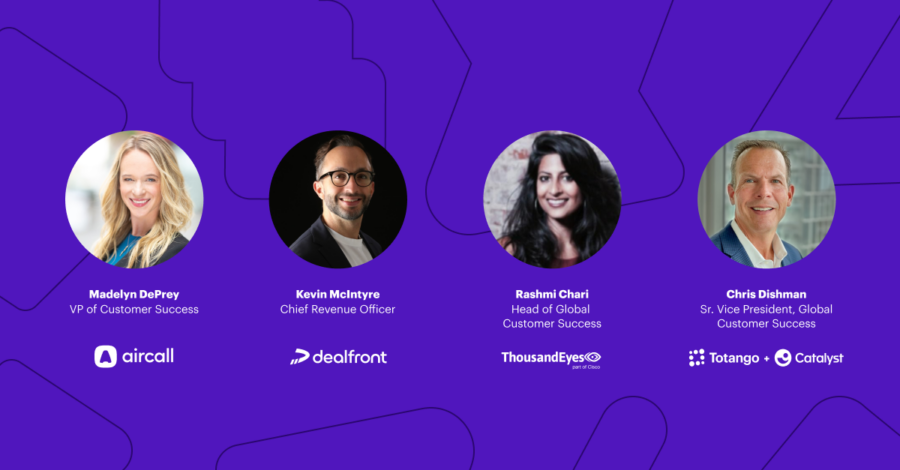Is 2024 the year of customer success or sales? Our CS and sales experts say, “Neither.”
Chris Dishman, SVP of Customer Success for Totango & Catalyst, hosted a roundtable discussion with industry leaders, including Rashmi Chari, Head of Global Customer Success for ThousandEyes, Kevin McIntyre, Chief Revenue Officer for Dealfront, and Madelyn DePrey, VP of Customer Success for Aircall. They unanimously agreed that 2024 is the year of the ICP (Ideal Customer Profile). This signifies that fostering an exceptional partnership between CS and sales teams — vital for long-term revenue growth, begins with understanding which customers can derive the highest value from your products and services over time.
Here’s a snapshot of their other “hot takes” from their discussion and some key takeaways. For the full scoop on all of their bold insights on team alignment and unlocking customer-led growth, check out the webinar:
The importance of team alignment and variable compensation
The roundtable kicked off with the consensus that aligning CS and Sales teams is imperative, not optional. The cohesion between these teams can significantly drive customer value and results, which impacts retention, expansion, and, ultimately, predictable growth. However, achieving this alignment between different functions is easier said than done, as revealed by mixed ratings from the panelists regarding the strength of this partnership within their organization.
Kevin highlighted a common issue in many organizations: Although teams may appear to have strong relationships, their working dynamics, including incentive alignment, may tell a different story. He suggested expanding variable compensation beyond just CS and sales teams to include product teams as well. This would establish shared accountability for net revenue retention (NRR) and ensure that all functions are incentivized to focus on long-term customer success. Similarly, Rashmi called out the opportunity for partner teams, like professional services, to have similarly aligned KPIs to CS, specifically to help drive more efficient on-boarding and adoption.
“You can have the most world-class CS [team], but if the product isn’t delivering recurring revenue, the team is going to be fighting fires all day,” Kevin shared. “It’s something that I would like to see change in the future where there’s more shared accountability between product teams and customer teams.”
The imperative of investing in digital customer success
As AI and digital tools become increasingly integrated into our daily lives, they are also becoming indispensable in creating and executing a successful customer journey.
Madelyn shared how Aircall is leveraging digital customer success to garner deeper product insights.
“I’m really geeking out about what we’re learning [regarding] rolling out a digital customer success strategy [focused on] product insights — not just if the customer is using the product, but which aspects they’re using and how we can double down on those to drive retention and growth,” she said. “My team is tasked with selling add-ons, and one thing we’re finding is that we haven’t done enough to understand what the story is, what the ICP is of that add-on, and how we can look at product behavior to identify leads. [This allows us to] generate true, qualified deals… We also need to sell them in a way that’s thoughtful, catering to drive that expansion revenue in a way that’s going to help our customers be successful and help them scale.”
The need for segmentation and ideal customer profile alignment
The panelists discussed a pivotal strategy that involves defining and aligning strategies around an ICP. The main idea is to clearly understand your ICP, and focus on your marketing, CS, and sales efforts toward acquiring and serving the customers who are most likely to derive optimal value from your services over time. This approach results in stickiness and retention that generate ongoing revenue potential.
Kevin explained that one of the biggest challenges between the CS and sales teams is often a misalignment on the ICP, which can have downstream effects on their cross-functional partners and make it difficult to manage opportunities consistently.
“We’ve been undergoing this massive initiative around how we define our target segments, looking across key firmographic information, product usage, data buyer personas, specific use case information, etc. to really understand the customers that renew. Not just the customers that we’re good at winning, but the customers that actually come up for renewal and maintain and grow with us,” he explained. “Through this, we’re trying to get a segment of customers that we want to win and that is where we’re proactively targeting marketing campaigns, outbound sales, optimized CS coverage, and where we want to have our account managers on for expansion.”
Foster alignment to unlock predictable growth
The roundtable underscored that the path to unlocking predictable growth happens before the sale and relies on the meticulous alignment of objectives, goals and processes between CS and sales teams. While their insights offered various innovative approaches, their provocative opinions regarding revenue management, up-skilling account management (AM) and customer success managers (CSM), and adopting cross-functional OKRs illustrate the tremendous opportunity to catapult the expectations of CS and sales partnerships to an entirely new level.
The panelists also presented several interesting perspectives during a rapid-fire discussion, answering questions about what they would want to do differently with renewal revenue management at their companies, how they define customer-led growth, what the most important skill for CSMs or AMs is, and more.
Watch the full webinar to hear all the hot takes on navigating the complexities of CS and sales and achieving harmony between these two teams. You can also learn more about how Totango & Catalyst can help you create a collaborative environment that propels customer value and business growth.

